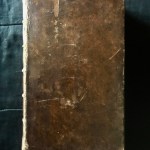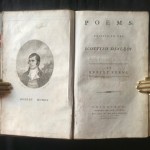BURNS, Robert. Poems, chiefly in the Scottish dialect
Edinburgh, William Creech, 1787.
SOLD
8vo, pp. xlviii, 368. Second edition. FIRST EDINBURGH EDITION, with the misprint ‘Boxburgh’ in the list of subscribers and ‘stinking’ on p. 263. Portrait, half-title, some light soiling. Contemporary calf, lightly worn, spine in compartments with contemporary red morocco label. Fine brown quarter morocco slipcase. Despite some soiling, a fine complete copy.
The initial ‘Kilmarnock Edition’ published by John Wilson of Kilmarnock on 31st July 1786. C. 600 copies at 3 shilling were sold out in just over a month of publication. Due to demand, William Creech, an eminent Scottish bookseller, published the First Edinburgh edition on 21st April 1787. Three thousand copies in all were republished. However, after the first batch had been printed, the type had to be reset due to the fact that an error had crept into the line ‘Address to a Haggis’ whereby ‘Auld Scotland wants nae skinking wave’ became ‘Auld Scotland wants nae stinking wave’ (p. 263). The first Edinburgh edition has thus become known as the ‘stinking Burns’.
On 23rd April 1787, Burns disposed of the property of his poems to Creech. In the event, Burns did not actually get paid till 30th May 1788, a matter that kept him hanging around Edinburgh many months longer than he anticipated. Nevertheless, he received a rapturous welcome in the city and a number of fine reviews of the work. ‘Poems, chiefly in the Scottish dialect’ are the production of a man in a low station in life which he composed ‘to amuse himself with the little creation of his own fancy, amid the toil and fatigues of labor; to transcribe the various feelings, the loves, the griefs, the hopes, the fears in his one breast . . . and man of them are elegant and pleasing . . . Such as are of the descriptive kind contain faithful and pleasing delineations of the simplicity and manners, and engaging scenes to be found in country life . . . Upon the whole, we think that our rural bard is justly entitled to the patronage and engagement which have been liberally extended towards him’. [Rev. John Logan (1748-1788) The English Review – Unsigned note, May 1782].
Rothschild 556.







